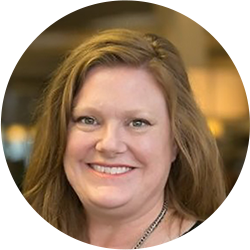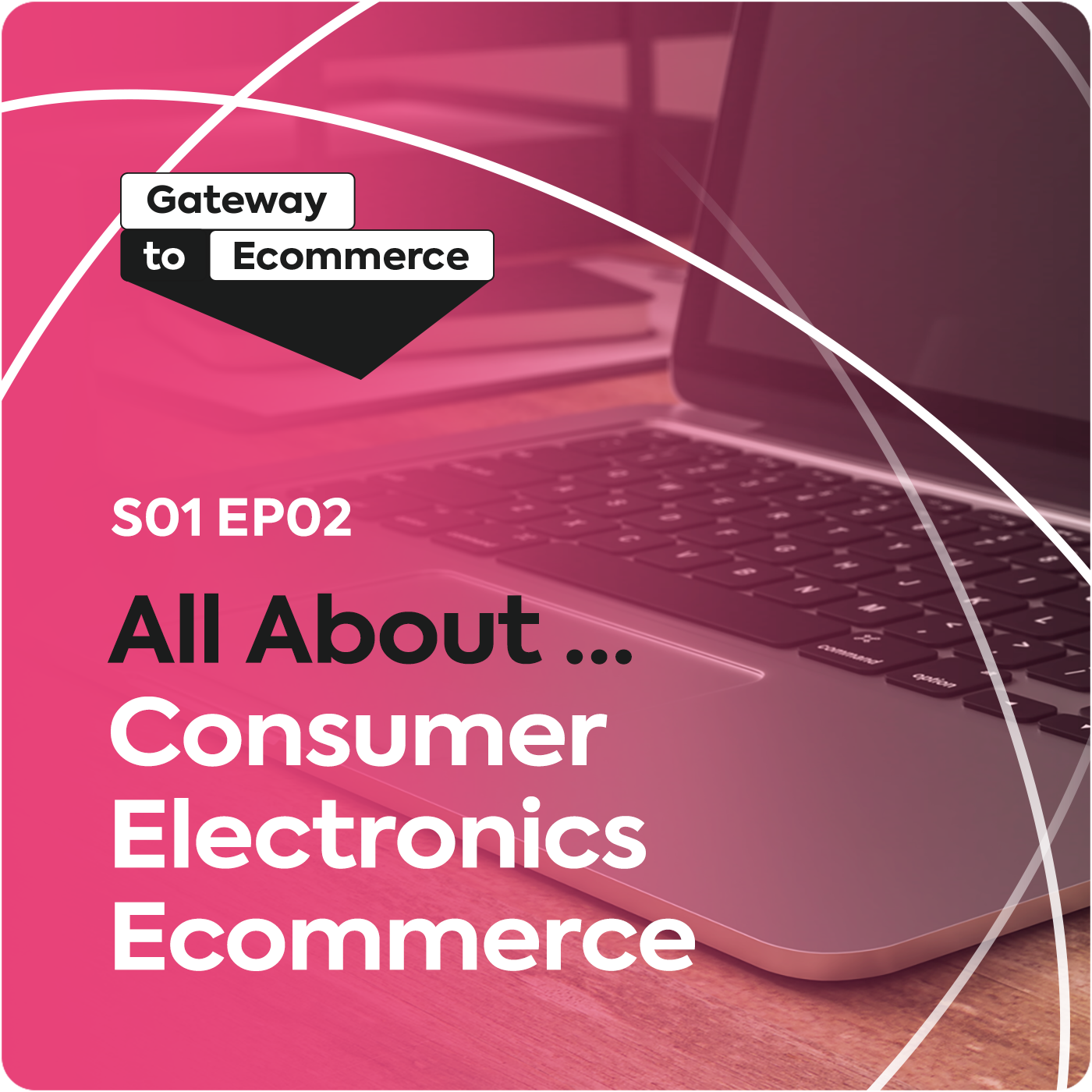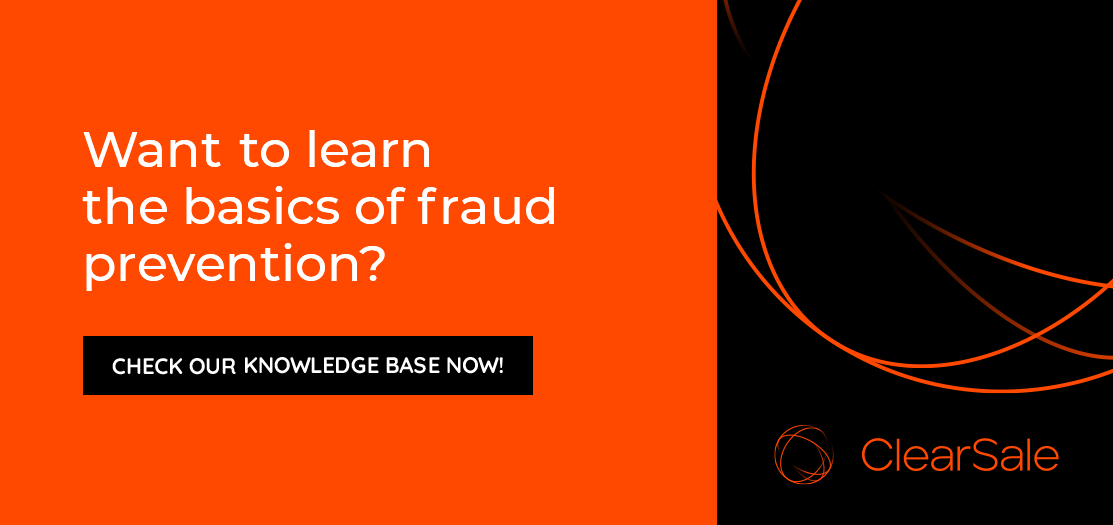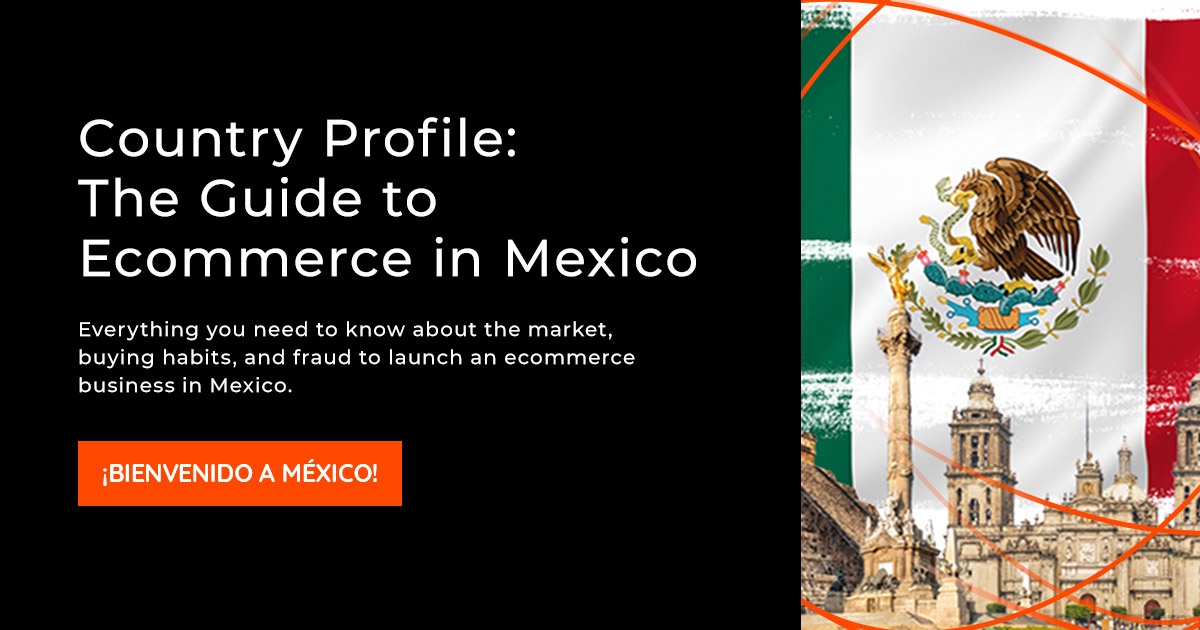Episode 02:
All About... Consumer Electronics ECommerce
Everybody loves their electronic gadgets.
From the ever-present smartphones, to wearable technology, to digital assistants, to laptops, people all over the world are integrating electronic devices into their lives like never before.
If you’re an ecommerce merchant selling consumer electronics, you have it made, right? After all, there’s nothing better than a hot market. The problem? High demand often translates into a lively black market and the fraud that comes with it. Consumer electronics are a hugely popular target for fraud.
On this episode of Gateway to Ecommerce, we sit down with Rafael Lourenco, ClearSale’s executive vice-president, to pull back the curtain on fraud in consumer electronics ecommerce: What’s happening, how to spot it, and how you can prevent it.

Podcast Episode Recap
In our second episode, we dive into fraud in the consumer electronics industry. But first, let’s introduce you to our hosts today:
GO TO SHOW NOTES
Who are your hosts?
-

Rafael Lourenço
is ClearSale’s Executive Vice President. A 12-year veteran at ClearSale, Rafael dives deep into the data science behind fraud prevention and ecommerce success.
-

Denise Purtzer
is ClearSale's (former) Vice President of Partnerships and Alliances, and lives for connecting the right people while using her understanding of the ecommerce landscape from every angle, for every size business, in every market.
Why Is Electronics Fraud Such a Problem?
As mentioned, new technology is always in demand. As such, fraudsters know they can quickly and easily find a buyer for most new products. After all, the items tend to be on the small size and easy to ship. There’s no worry about getting enough sizes to meet everybody’s needs, and their price point allows for a good payout even at low volume.
To add to the complexity, it’s really tough to predict fraud patterns in this industry. Why? Because it attracts so many first-time online shoppers. Consumer electronics can be expensive, and everybody’s looking for a deal. So brick-and-mortar shoppers may go online if offered a lower price, making it tough for even the savviest merchants to tell a first-time shopper from a fraud attempt. This can result in a high number of false declines, which not only costs you that sale, but may cost you that customer – and your reputation.
What Does Fraud Look Like in Consumer Electronics ECommerce?
We think of fraud as somebody just sitting at a computer with a bunch of credit card numbers. But because consumer electronics is such a popular fraud target, anything goes:
Fraudsters have used account takeovers to order items to the legitimate cardholder’s address, and then shortly thereafter, posed as service reps from the merchant, saying they’re there to pick up an item that was delivered by mistake.
They use gift-giving holidays (and the sales spikes that take place as a result) as cover, sending through hordes of fraud attempts in an effort to slip some past the merchant’s fraud filters.
They’re also taking advantage of the fact that with everybody working from home, legitimate customers are making large purchases, perhaps to new addresses. This makes it incredibly difficult for merchants to pinpoint fraud attempts.
Many small and medium-sized businesses think fraud won’t happen to them, but with so much demand out there, fraudsters will try every site they can get their hands on – and especially the smaller ones who they figure won’t be as fraud-savvy.
Preventing Fraud and Growing Revenue
Like we said, false declines are a big problem in the consumer electronics industry. And it’s costing merchants a lot of money: A laptop manufacturer we work with used to decline between 20%-25% of their orders … but they weren’t considering any of it potential revenue. After a month with ClearSale, they were declining only 5% of orders, without any corresponding increase in chargebacks.
There’s an irony to fraud protection when it comes to consumer electronics: It needs human beings to really work. Fraud rules and machine learning are two very important layers, but a third layer is also necessary, where expert fraud analysts carefully review flagged orders. This ensures every good order is approved, every fraudulent order is declined, and everybody is happy... except for the fraudsters.
Stay tuned for upcoming podcast updates and new episodes.
episode Transcript
Podcast Introduction
You're listening to Gateway to Ecommerce, a podcast by ClearSale. In this series, global ecommerce leaders discuss challenges, best practices, new tech, and secrets to success. And now, your hosts, Rafael and Denise.
Denise Purtzer
My name is Denise Purtzer and I'm joined by my co-host, Rafael Lourenco. Welcome Rafael.
Rafael Lourenço
Hi Denise, hi audience. I'm excited to be here.
Denise Purtzer
It's good to be here today, because we're going to be talking about consumer electronics. And they're in high demand, but it comes at a high cost when it comes to fraud for merchants. By the end of today's episode, you're going to have the perspective on the current landscape and be able to pinpoint what your company can do to be protected against the increased fraud and risk associated with consumer electronics.
Rafael, electronics fraud has become more and more problematic as countries begin to embrace ecommerce. Based on what you discuss with ecommerce leaders in your experiences, why is that such a problem?
Rafael Lourenço
Well, Denise, I think there are many reasons why consumer electronics tend to be one of the focus of fraudsters and why everybody has a hard time when trying to prevent from those fraudsters to be successful. The first one that I like to mention is the fact that it's very easy to resell those types of products. They are small, they are easy to put on storage. I think that's something that would be likely interesting for fraudsters, right?
Denise Purtzer
Totally. If they know if it's a brand name product, they can resell it. And so that makes it more appealing as well, because they're not having to worry about that piece of it.
Rafael Lourenço
And the fraudsters are looking for things that, one, are easy to resell, as I said. But two, also not too many SKUs, meaning not too many sizes and colors. When it comes to apparel, for instance, as a comparison, that's very much different from consumer electronics. Just to pick up an example, an iPhone X black is just an iPhone X black, so it's easy to resell on marketplaces and stuff like that for a much lower price, which brings us to a second element, that is high value, right?
Denise Purtzer
Yes. So you've got your iPhone X, and it's $1000, it's much easier to recoup that $1000, versus having to sell 10 pairs of jeans or whatever the case might be.
Rafael Lourenço
Exactly. If fraudsters just are able to offer it on the black market for 10% discount, it's already $900, just to pick up your example, right?
Denise Purtzer
Mm-hmm (affirmative).
Rafael Lourenço
I feel like consumer electronics, laptops, phones, GPSs, are definitely a focus for fraudsters. And it's interesting because it's also a focus for first-time buyers. So people that never bought online, the high value for those products make them more attractive to be bought online. Because the same way that fraudsters can make money with it, the first-time buyers, when they see a 5% discount or something like that, they can see the value and they eventually will take the risk to make their first time online purchase, buying one of those products.
Denise Purtzer
That's so true. My parents never buy anything online, and they bought their iPad online because there was a good deal, and they didn't have to go into the store and be confused about what they were purchasing. They had their list of what they were supposed to buy, and just went ahead and checked out online. I can see definitely that that would be a way to attract first-time buyers. But that makes it confusing too for the merchants, because then how do you know it's a valid sale?
Rafael Lourenço
Exactly. And it's very confusing because we have, let's say the worst combination here. They’re highly attractive for fraudsters, but are also highly attractive for first-time buyers. And how do you tell them apart from the other? And I think that links us to the second biggest or as big of a problem as the chargebacks, that is the false declines. You have a very risky product, you have a lot of first-time buyers trying to buy it. And if you get too conservative with your fraud futures or your fraud strategy, you're going to end up affecting customer experience.
Denise Purtzer
That's so true. That's one of my favorite things to bring up when we're talking to merchants here at ClearSale, because that's a piece that's easily ignored because it's something that they don't know is an issue. If they're declining somebody falsely, and that means that a good buyer goes into the cart and they're making a purchase, but for whatever reason, the filters, like you said, will catch it and decline it, in which case that customer is not going to come back. Most oftentimes that customer gets declined and they're embarrassed and they're going to go to your competitor.
And everybody knows that it's easy to shop for prices and things like that. So in this case, they're not going to have that sale then, but they're also not going to become a customer of theirs in the future, and that becomes a bigger issue.
Rafael Lourenço
I think you brought an interesting point because when people think about the false positive problem, I think very often people think about that particular purchase you're losing, but actually you're maybe losing the whole lifetime value of this customer. And especially with computer electronics, as you said, the loyalty is not there necessarily. The same thing that makes fraudsters like this product, the fact that it's easy to resell, easy to buy and make your parents comfortable buying it online is the same reason why people will jump from one version to the other randomly.
The first one that pops up is the first one I'm buying. It's not that I'm super attached to the brand or something, because I'm buying, again, the example of iPhone X, it's going to be the very same product and is going to be there. So the false positive brings us the potential loss of this revenue, but the revenue referring to this purchase, but also future purchase from the same consumer, right?
Denise Purtzer
Absolutely. And I was reading an article we share with merchants quite often from LexisNexis that states that it's about three times as much of an impact financially because you don't get that follow on revenue. So when merchants are thinking about that, or not thinking about it in this case, they need to, because of the fact that it is much more impactful on their business.
Rafael Lourenço
And when I think about it and I think about the potential losses of revenues and the potential losses and chargebacks, I know that it's especially impactful for a consumer electronic merchants, because the margins are so tight.
So we are talking about a business that the markup, you look at apparel or furniture in one end of the gradient with a high markup for their products while consumer electronics is super low margins business. So I feel like we are in the nightmare of the fraud prevention. So high attack, high first-time buyers and low margins, low financial space to work your fraud prevention strategy.
Denise Purtzer
But one of the things that I think is really interesting is we think about fraud as being somebody just sitting back in some back room in some different country with a bunch of credit card numbers, just trying to run them through. But I think there are other situations that are even more sophisticated with fraud specific to electronics. And I know you've got some good stories to tell, what's your favorite?
Rafael Lourenço
Well, I have definitely a favorite one and it's interesting. This episode is about consumer electronics because this story is specifically about a fraud scheme that involved televisions.
We had this merchant and they were selling basically everything, furniture, electronics and other stuff, but we started to see specifically, a spike in chargebacks for transactions delivered in a certain region, specifically in a couple of zip codes. Then we tried to investigate further and those transactions were being automatically approved by our systems, meaning things were seeming to be matching the data. So the credit card was used before by the same consumer in the same address. And this is usually evidence of good orders, right.
Denise Purtzer
Exactly.
Rafael Lourenço
So we tried to make it a second layer investigation, and here's what we found. Making a long story short, we found out that the fraudsters were doing an account takeover, meaning they were invading, hacking good customers' profiles at this particular merchant's website. And they were purchasing and shipping those televisions to the same address of good customers.
So let's say you, Denise, you have your credit card registered in a given merchants' website, and then your credit card is there, your address is there. And then they made a purchase to be delivered at your house. So out of nowhere, you see a television being shipped to your house.
And then what was interesting is that a couple of days later, or in the next day, the fraudsters themselves went to the consumer's house or apartment dressed like they were part of the merchants uniform. They were dressed in the merchants uniform with the logo and everything else, and they were asking the consumer, "Did you receive by mistake a television?" And you would say obviously, yes, because you did not buy it and you would give them back the TV. Who wouldn't? And that's how they were stealing. It's credit card fraud, but how would you tell apart Denise's purchase from the fraudsters purchase utilizing Denise's data points, all the personnel information?
Denise Purtzer
Interesting. So it goes way beyond just the credit card, fraudsters can get really tricky.
Rafael Lourenço
Exactly. They can even dress up for the crime.
Denise Purtzer
Actors in the part, for sure. Well, that's a cool story. I love hearing that. I also think that from the merchant's perspective, it's just so mind boggling, all the different things you have to think about. And one of the other things is electronics also are definitely seasonal as far as different holidays and things like that.
I know that Father's Day, for instance, is a big time, but then even other countries like Buen Fin, and things like that, where there are sales going on and people are grabbing up electronics because they're expecting those sales to happen. I think that that makes it even more difficult for the merchants, because they don't know if that's a seasonality spike, or if it's a fraud spike, or that sort of thing. What do we usually tell people in that situation? How do you handle that? How do you know as a merchant?
Rafael Lourenço
Well, that's really tricky, because as you said, not only it's hard to tell apart those sales peaks from actually fraud peaks, but also, you as a merchant or if you have an internal team handling fraud prevention, you're prepared, let's say for 100 orders a day. And out of nowhere you start getting 500, 700 or 800 orders. And on top of all the difficulties you would face with any order in particular, now you have a spike, you have other layers of hard time you're facing.
And if we are talking about global merchants or manufacturers, and at ClearSale we work with a few of them that have presence in multiple countries. Now you've got to understand that this movements, this spikes are local. So the Father's Day is in different dates throughout around the world, the same for Mother's Day or any other relevant date that triggers people to buy electronics. So this is really tricky, as you said.
Denise Purtzer
It would be. And then, I started thinking about too, just recently, I know we moved a bunch of people to working at home, as did a lot of companies. And I talked to friends who moved to home situation in this current environment, and a lot of them didn't have laptops to work with or things like that. So then you start to see a big spike in the purchase of laptops coming from all different sources, and again, new customers. A lot of times these employees were just given a stipend to go ahead and make the purchases that they needed to. And so that got me thinking that that was probably a crazy time for a lot of merchants to trying to disseminate whether that was fraud or not.
Rafael Lourenço
Definitely. And we're talking here about eventually new addresses being utilized. I don't know if you know a lot, but I know a lot of people that are spending the quarantine in different locations rather than their original house, because it's an apartment or anything like this.
And the number of purchases in a small period of time, especially in the beginning of all this, it's also a red flag for any fraud prevention strategy, which brings us back to the point that you brought, Denise, about the false declines. The more merchants are fearing to have fraud and chargebacks, the more they will tend to also make a mistake on the other end of the flow, trying to block frauds from happening and they may end up blocking also good consumers. I know that you are talking to a lot of partners and merchants out there and seeing some interesting stories with or without ClearSale in terms of changing those KPIs.
Denise Purtzer
That's so true. Just on the partnership side, we work with a lot of payments companies, and it's very easy to say, "Okay, we're going to offer a payments option," and then it becomes a commoditized situation for those partners, whereas if they can say that they've got fraud prevention built into it, the merchant doesn't have to worry about dealing with all those sorts of things themselves. And it becomes a much stronger proposition for that partner to sell.
So we always say that we're better together. And it's really true because we touch so many different parts of the purchase process, even into customer service and things like that for merchants, because we take care of the different things that they don't always know how to handle. [crosstalk 00:15:43].
Rafael Lourenço
I feel like if I was a merchant, if I was working for a merchant, I would try to hire the specialist in each step of the process, obviously, depending on your size, you wouldn't have the chance of hiring 10 different solution providers for 10 different problems. You may want to pick up one for two or three of the issues. But as you grow and as you have aggressive and ambitious plans, you should, as a merchant, if I were you, try to find a specialist for each step, as you were describing. And what about merchants? How has been your experience in talking them about this, especially on the consumer electronics side?
Denise Purtzer
I think one of the things that comes up quite often is the fact that people see that ClearSale works with a lot of large brands and things like that, but a huge portion of what we do is also with that smaller merchant or that medium-sized merchants. And those merchants oftentimes don't understand that fraud can sneak up and catch them as well.
And the SMB client is just as susceptible, because right now we've got, like we you talking about before, it's the perfect storm, where we've got more credit cards that are being taken from phishing sites. The early stats that I saw even a month ago, it was up 65%. And then you've got more fraudsters throwing their hats in the ring because there are people that are out of jobs, they have time and they're desperate for money.
So you put all of those things together, and of course, they're not just going to hit the largest sites in just electronics, they'll dig deeper, and deeper, and deeper. And then we always talk to merchants, it's not about if you will get hit, it's about when. When they start to think about that and they think that they're susceptible, then it gets their minds flowing and then a lot more questions come about. But that's probably one of the biggest things that we talk about with merchants.
Rafael Lourenço
And when it comes to small and medium merchants, I feel bad for them because it's not only that they are susceptible as well, but actually they will get hit hard. Imagine, I was talking about the low margins, so you got to do like 20 good sales to compensate one chargeback or even more because of the fact that the margins are so tight, the chargebacks will hit you so badly, and will be much more impactful versus a situation where let's say, if you are a big merchant, if you are a great corporation, yes, you have a couple of months with the worst KPI. That's bad, but you can handle, while if you are a small or medium business, eventually two months of a few chargebacks may even drive you to bankruptcy that we've seen this a few times in the market.
Denise Purtzer
That's so true. And we were talking to a merchant who was selling baby goods. They thought, "Who's going to try to hit us for baby goods?" And this was last spring at a conference. And we talked to them and they said, "We've got our fraud stuff under control. We're only getting small chargebacks coming through, 25 to $75. And we sell $1000 to $2,000 cribs and things like that. So it's not an issue with us."
And they called us, it was not three months later, called us in a panic and said, "We've had $15,000 in chargebacks in the last couple of weeks and we don't know when the bleeding is going to stop. How quickly can we turn on fraud prevention?" So that's a very typical pattern. I think that we've heard that story. You just insert different names, different product, different numbers, but we hear that constantly, don't we?
Rafael Lourenço
Yeah, we do a lot. We do a lot. And again, not every company can handle a $15,000 debt out of nowhere, right? Not predictable, not expected.
Denise Purtzer
Exactly. That could take [crosstalk 00:19:41].
Rafael Lourenço
Every time that we talk about chargebacks and how bad they can hit you, I always like to bring up the counterpart, that is the false declines once again. When it comes to merchants, because they are afraid of chargebacks, they end up being too conservative on their fraud futures and start to block too many orders. That's also not good. I know that you talked to a few brands that also made that mistake, not only allowing chargebacks from happening, but also being too conservative, right?
Denise Purtzer
Absolutely. And it's a really beautiful thing when we can take those false declines or those declined orders and turn them around into sales. Because if you think about the merchant has already done the work. We were working with a laptop manufacturer that works globally, and in different parts of the world, this is something that's not a lot of merchants understand either if they're just selling in the US, as an example. But the decline rates and the fraud rates and things like that in countries like Latin America, as an example.
So they want to start selling south of the border in Mexico. It's a whole different landscape. And we were working with a specific laptop manufacturer who's selling global and they were having some of those issues and false declines. And when you can start approving those orders, and then they don't have to worry about the chargeback because it's guaranteed with a partner such as ourselves, then it makes their selling much easier. It just increases their net bottom dollar and things are much better for them.
Rafael Lourenço
Definitely. And I think one important thing, you mentioned the baby products case where they didn't know. And I think that's the same for false positives. And even more frequently, we see people that either they don't know how many orders they are declining, or they don't know that those declined orders would be a potential revenue.
So we are talking about, like this computer manufacturer company you just mentioned, they were declining something between 20 and 25% of their orders, but they did not call it potential revenue. They were labeling it as fraud. These were frauds we were blocking from happening. But then in the next day they started working with ClearSale. They were from something between 20 and 25. The first month of operations with us they were already declining only 5%. Something between 15% and 20% more in sales, which everybody can benefit from.
And if they were frauds, all of those would be turning back as chargebacks, which they did not. So only after implementing a new fraud prevention strategy and realizing that they were approving 15 to 20% more, and none of those orders were turning out to be chargebacks, then they believed that they shouldn't be declining all of those. Because they were declining based on reasonable futures. Proxy IP, shipping address different from billing address. Those are fraud futures that are reasonable, they are interesting. The big question mark is, what do you do with the orders that you flag?
Denise Purtzer
A lot of merchants ask us, "If you don't just use a simple rules-based system like we're doing, how is it that you can get those increased orders?" And that's something that we always share in the fact that you can't just do something by machine learning alone, because you could be teaching your machine the wrong thing.
With false declines it's so true. If it starts learning that the false declines are acceptable, the problem will only get worse over time instead of better. And that's why we've taken the approach of adding that human intervention and looking at anything that suspect with the human eye and then feeding that back into the machine. And that's where we feel is the perfect mix of things, instead of just relying on a machine.
And it's something that seems so simple, but it truly is what works, and the merchants are just floored by it sometimes. Because I think the chargebacks hit them smack dab in the face. They see that on their statements, they see that it's a negative value. The false declines just disappear into thin air [crosstalk 00:24:18].
Rafael Lourenço
And I definitely agree with you when it comes to this human touch you just mentioned. A lot of times when we talk about many review as part of fraud prevention strategy, people think about an old-fashioned procedure. And actually, I think it's the other way. So we are talking about fraud rules as a first layer of protection where you can turn on and off, enable and disable some of those rules.
I think machine learning is the next layer, is the new generation in a way of combining all those fraud rules with different wages so you can be even more creative creating this rules. And they will turn out to be variables of your machine learning.
And I think a third layer of protection would be having at least a small percentage of your orders being reviewed by a human being, as you said. Because these many revisions will feed back to the machine learning to the algorithms, and now the algorithm is going to be much better than it would if you just try to decline those orders, and you would never know what would happen with those orders.
How many times we as consumers, we're trying to buy something from a given merchant, and for any reason related or not to fraud related or not to payments, we were blocked from buying. And that is so frustrating. You go back to the customer experience thing where obviously, especially if you're a first-time buyer, they are so common on consumer electronics or if we are talking about people buying gifts.
You are buying gifts in the last minute and you get blocked. None of us want to be blocked, we don’t want to be stopped from buying what we want, and we want actually. Because we are going to move forward to the next merchant, as we said before, and that's really a big thing for the initial merchant we were trying to buy with, as they probably spent a lot of money marketing to bring this person to the website, make them with a good purchase journey. And then when they click and buy, they are just blocked by any of those fraud rules. So that's why I like so much this approach where you give the benefit of the doubt to each and every order.
Denise Purtzer
Exactly, exactly. Those small and mid-tier merchants are scrambling and competing on so many levels with the Amazons and the other marketplaces in the world that can deliver faster, cheaper, everything else. And this is one more layer that they don't need to add to that competitive value against themselves. It's something that can be easily taken care of and puts them more on a level playing field.
Rafael Lourenço
Sometimes it's not even fair, this competition, you just mentioned. If there's one thing that the smaller, medium merchants can do better is make their customer experience so unique and personal. And I think the fraud prevention can and should play a role on this differential.
Denise Purtzer
Exactly. Well, I think we could go on and on forever because we both are very passionate about fraud, but the good news is we've got other podcasts coming up. So as we wrap up today, remember that fraud is not something that you have to fight alone, that it can change constantly, and it's something that can be very seasonal as well. All of these things, and in considering that not just the fraud of the chargebacks, but also the false decline piece, I think these are all important points that we covered today.
Rafael Lourenço
Definitely. And I think when it comes to finding your fraud prevention partner, I also want to add the fact that each industry has its own peculiarities. We spent a few minutes today talking about how much consumer electronics is a target for fraudsters as well as is very attractive to first-time buyers. How much the sales peaks vary from one country to the other and how it affects the fraud prevention strategy. A lot of things that are very specific about this specific industry.
One thing that I'd like to let as an advice to anyone listening is that fraud prevention is not like a one size fits all, it's something you should be looking at someone who really knows about your specific industry and has business cases with your specific industry, your specific size of company, because different sizes also bring different challenges.
I think we did cover a lot of ground here, but there would be a lot more to cover. But I'm glad that we have the chance to share a little bit of our knowledge and experience with our audience.
Denise Purtzer
That's so true. And given that, since we talked about vertical specific things today, you can join us next time for the third podcast. And Sarah and David from our team are going to continue to discuss ecommerce fraud with the focus on Mexico. So we're going to start talking about more of a locale and the impacts of selling in different countries.
So if you'd like to know more about how to prevent ecommerce fraud, visit our website, we have a ton of resources dedicated to this topic that can help you on your ecommerce journey at www.clear.sale. If you have any questions or would like to suggest a topic that you'd like us to cover in the future, send us an email at podcast@clear.sale. Thank you for listening.
Podcast Outro
For more ecommerce insights, visit us on our website at clear.sale.













